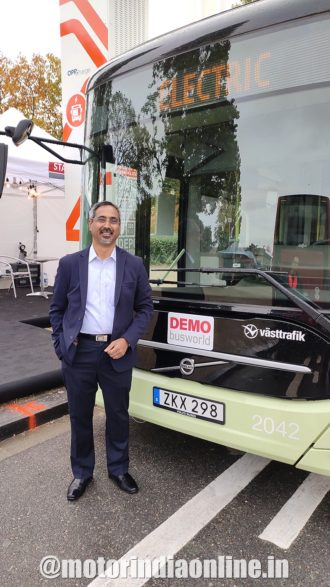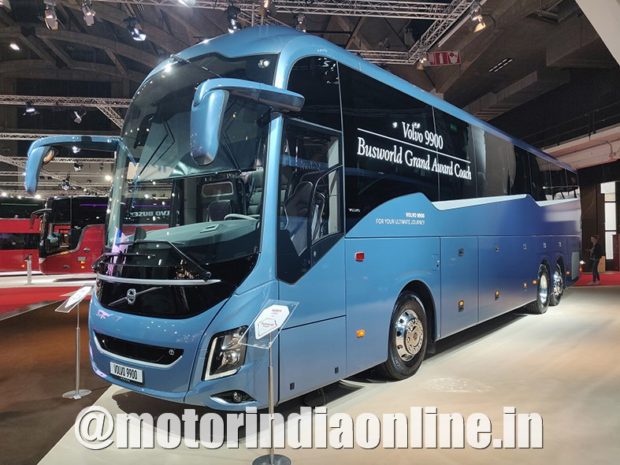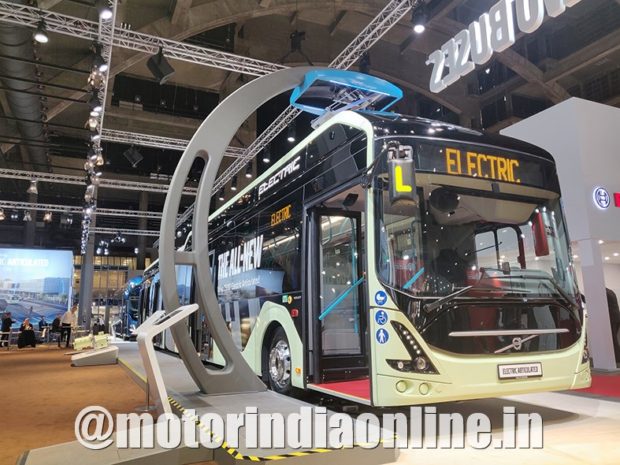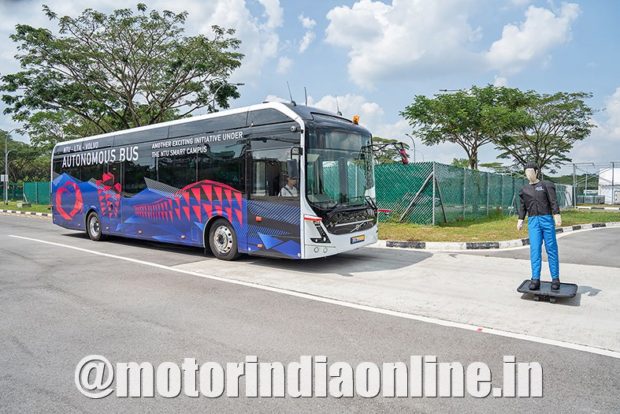Akash Passey, Senior Vice President, Volvo Bus Corporation, is a man to be reckoned with. Having had the privilege to kick-start a hitherto unknown premium bus brand in India at the dawn of the century, he has been instrumental in making Volvo Buses a big hit in the domestic bus industry, making the brand synonymous with luxury and safe bus travel in common man’s lexicon. With over 25 years of experience, he is currently responsible for business performance of the Swedish bus maker in the international region covering Asia Pacific, Africa and the Middle East, China, CIS countries and India. In a detailed interview with MOTORINDIA, he tells Dhiyanesh Ravichandran that Volvo Buses has always been a global pioneer of tomorrow’s technologies since day one, and will continue to set new benchmarks on safety, environmental care and quality in every regional market it operates

Volvo Buses is one of the world’s largest manufacturers of city buses and coaches. In this new decade of 2020, could you tell us about your global presence? Which are the top leading and emerging markets that are quite promising for the brand at present?
I have been responsible for the international division of Volvo Buses for over seven years now. During this period, we have made good strides all across globe. We have already made our presence felt in Europe and, to some extent, in the Americas as well, and in recent times we have had immense success in moving into different parts of the world in a vibrant manner. On the whole, I would say we are in a dominant position in most of the leading cities of the world, with a healthy 30-50% market share in public transport, city bus, and long-distance segments. Prominent among them are Singapore, wherein almost 70-80% of double-decker population is that of Volvo.
We have recently supplied some 50 hybrids as well; Australia with over 40% market-share in city buses, Hong Kong with over half of the double-decker market-share – even more promising for us with the city’s recent transition to Euro 6. Some 700+ buses with Volvo moniker will hit the roads in Dubai and Abu Dhabi in the UAE this year as part of the run-up to World Expo 2020 scheduled in July this year at Dubai. We are posting good businesses in markets like South Africa, Morocco and India. More specifically in India, we have a stronghold in the premium segment with almost 90% market-share, along with a bit of the city bus segment as well. Over the years, we have also grown immensely in South East Asia, Oceanic, Middle East and African regions, while a continued focus is also on CIS countries, including Russia.
How is the Indian market weighing up at present for Volvo Buses, considering the host of disruption and challenges including that of prolonged market slowdown and BS-VI transition?
India is the world’s second-largest bus market in terms of demand volume. I have a strong emotional connect with India, being a person of Indian origin and having the privilege to establish the Volvo brand here. I can say with confidence that the Indian bus industry has come a long way. At present, the local automotive industry including commercial vehicles is going through one of the toughest phases in recent times. We would like the business to pick up at the earliest and therefore our focus right now is more on sustenance. That said, the BS-VI emission is coming to effect at this critical juncture.

I appreciate the government’s bold initiative to leapfrog from Euro 4 to Euro 6-equivalent emission norms, which fits into Volvo Buses’ agenda. Although we make products compliant to different emission norms ranging from Euro 3 to Euro 6 across the globe, a majority of them are turning out to be Euro 6-compliant. In that respect, BS-VI in India is a good thing – it’s a high-technology and a much cleaner proposition than what we have seen so far. Sophisticated technologies will play a much bigger role in BS-VI vehicles. We at Volvo Buses have already been engaged in doing the same for over six years with global expertise and so we are ready with new vigour and shall take it forward in a good way.
When can we expect new products lines from Volvo Buses to complement the BS-VI progression in India, apart from those existing offerings that are now becoming BS-VI-compliant?
As far as new product lines are concerned, as I said earlier, the focus right now is very much on market sustenance and transition from BS-IV to BS-VI. As and when the market bounces back from the slowdown and reaches a stabilisation phase with proper demand, we will certainly have some new products. However, there is nothing immediately at this stage.
Electric mobility is gaining immense momentum in public transportation. We see Volvo Buses stepping up its ante with a wide range of electric buses, the latest being an 18-metre 7900 Electric articulated bus. What are your impressions on e-mobility and which are the markets that are electric-ready in this regard?
E-mobility is the quintessential step in moving away from IC engines towards cleaner and sustainable solutions, probably achievable in the next 20 or 30 years. We are one of the pioneers in electric vehicles for public transportation. With the battery technology having evolved further and better, it is possible to create better and longer public transit solutions. The 7900 Electric articulated bus can carry more passengers, especially for peak hour rush scenarios in metros.

It is a robust solution to carry more people and thereby strike a perfect balance with safe, comfortable solutions and lower operating costs. Currently, most of the electric bus-focused tenders are coming from different parts of Europe. The continent is transitioning into electric for public transportation. Other regions like parts of North America, Asia, selected places in the Middle East and Africa are also coming up in small ways, and we foresee the demand to go up in the coming years, as the battery technology improves and costs reduce further.
What is your product strategy altogether? Are electric and hybrids products complementing the conventional offerings or is it the other way?
Volvo is a strong brand in the CV industry with a distinctive presence for over 90 years now. We do everything to match our core values of safety, concern for the environment and quality. In the bus industry, it is normal for the customers in the Western countries to run a vehicle for at least 15 to 20 years to its full lifetime. Today, that is quite possible with conventional diesel buses. When it comes to alternative powertrain solutions, our customers have similar expectations – they would like the same traditional lifespan to apply. Thus, keeping our core values and customer expectations in mind, we design our products and strategize technologies. I am happy to say that our buses – may they be diesel, electric or hybrid models – stay true to our customer expectations about longer operational life and better return of investments with their lower lifecycle costs.
When can we expect the Volvo 7900 Electric to reach Indian shores? Is the domestic market ready for the electric transition?
At this stage we feel that the domestic market is not yet ready for e-buses. That said, we are closely watching the scenario. The maturation of the market has just begun. Volvo Buses has strong manufacturing and commercial facilities in the country, built over the last 20 years. We stand ready to play our part in the country’s e-mobility transition as and when things evolve. Further, battery technologies have not reached a stage where they can support electric buses to operate longer duration with full air-conditioning, especially in tropical countries like India. So, with technological improvements in the times ahead and encouraging market conditions, it’s just a matter of time for Volvo e-buses to reach India.
Do you think that hybrids make more sense to India and other markets alike right now?
Yes, absolutely! We have already launched a hybrid variant on the city bus platform in India. Not just India, but all over in Asia, the Middle East and Africa, we think that hybrid buses are a very good solution where there is no external charging facility or infrastructure required. With hybrids, you can still save about 30-40% reduction in the emission level depending on the conditions, as well as fuel-saving with the combination of smaller engines and battery pack.
What is your opinion on electric power for long-distance coaches? When can we possibly expect the flagship Volvo 9900 going electric?
Well, there are a couple of objectives that have to be met with electric solutions. Pollution and noise reduction are among them, so does self-sustaining business for the operators in a commercial context. Whatever the product is, it has to make a profitable proposition to our customers. With respect to electric buses, all these objectives are largely met in city buses only at present. Having said that, yes, it is imminent for long-distance segment to go the electric way, but the battery technology and capacity has not reached the stage where one can fully drive pure electrics beyond a certain range. With technology evolving further in the future, there is a clear chance that our flagship coaches will become electric as well.

Speaking of future technologies, Volvo Buses is leaving no stone unturned in developing autonomous bus solutions as well. How path-breaking is this, and how far are we from the technology’s commercial debut in public transportation?
We started to seriously consider electric buses some 10 years back, right when everyone in the industry thought that this would take a really long time. But to everyone’s surprise, we see the global bus industry embracing e-mobility in a big way. We have also progressed phenomenally in developing real-world battery-electric solutions in the decade passed by. Similarly, three technological megatrends are matching themselves in our field, including e-mobilty, connectivity and autonomous solutions. Volvo Buses, yet again, is proving to be a pioneer in developing autonomous buses for tomorrow’s needs.
We started working on the autonomous concept a couple of years ago. Early last year we commenced the trials of our first 12-metre autonomous buses in Singapore on a dedicated test track, as well as at a depot, where the bus can go in to park, charge, and clean – all by itself. At this point in time, we feel that the development is not yet ready for public roads, and I personally count another 10-12 years for commercial operations. However, the levels of autonomous operations, aided with latest developments in artificial intelligence, will keep on improving, which is bound to enhance driving efficiency and passenger safety. So, from a public interest point of view, it is of immense importance for autonomous solutions to become a way of life.
Can we say that the autonomous solutions are more of a technological progression from today’s advanced driver-assistance systems (ADAS) that are already offered in your products, like Volvo 9900 coach, for instance?
Yes. Although our autonomous vehicles on trial are city buses, the coaches of today are very different from their siblings that were on sale some ten years ago. A slew of ADAS technologies like that of dynamic steering, pedestrian braking, lane-changing assist and detention, object detection, and so on, have significantly improved vehicular safety and reduced driver fatigue. We have to keep in mind that with the absence of common harmonious legislation for operating autonomous vehicles, the driver is here to stay. His or her presence is very much needed for a safer feel among passengers, in spite of any advanced systems, just like a commercial airliner where the pilot’s role is still relevant. That way, it is clear that the fatigue level for the driver is progressively going down with the addition of new safety systems.
“BS-VI is a good thing – a high-technology and a much cleaner proposition. Sophisticated technologies will play a much bigger role in BS-VI vehicles. We at Volvo Buses have already been engaged with the same for over six years with global expertise and so we are now ready with new vigour and shall take it forward in a good way.
– Akash Passey, Senior Vice President, Volvo Buses